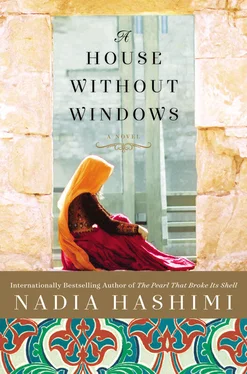“Perhaps he had just eaten,” Yusuf agreed, not sure what the point of this story was.
Gulnaz stared off into the distance.
“Then, exactly two months later, we were invited to the wedding of Kamal’s sister. It was a summer evening, hot and dry. Kamal nodded at me and barely acknowledged Rafi. Rafi went out of his way to strike up a conversation with Kamal, as a brother-in-law should. ‘Come visit us again. We don’t see you often enough.’ Rafi is that way. He wouldn’t turn the devil away if he came knocking on our door.”
“What did Kamal say?”
“He said he wouldn’t step foot in a house that had treated him like a dog. He said we’d disrespected him by eating in front of him and offering him nothing. Before we could argue, he had shoved Zeba to get her away from us. Half his family heard what he’d said. We left. There was no reason for us to stay after that.” Gulnaz’s face betrayed no emotion.
“I don’t mean any disrespect, Khanum, but it’s a big jump to get from there to a reason for his murder.”
Gulnaz let her eyes close for a second.
“Maybe you’re right,” she agreed softly. “And maybe you’ve got a lot more investigating to do.”
THE QAZI HAD AGREED TO SEE GULNAZ, A HIGHLY UNUSUAL turn of events, but Gulnaz had expected nothing less. The judge had shown great restraint when Yusuf made the request, careful not to let his face twitch at the mention of Safatullah’s daughter. Safatullah’s daughter — meaning the woman that young lawyer had brought into his office was Safatullah’s granddaughter. It was the murshid ’s granddaughter who’d been dragged out, screaming and limp, by the guards.
Unimaginable.
Qazi Najeeb shook his head to think of what his elders would have said about such a scene, but the elders from their village were long dead.
The qazi hadn’t seen Zeba since that episode, and he was, truthfully, not anxious to summon her back.
When the guards led Gulnaz into his office, Qazi Najeeb stood instinctively. He was unaccustomed to having women ask for an audience with him, much less one like Gulnaz. She’d been a near legend in their town even as a young woman. There were rumors of her powers, too, that she could cast spells and sway minds with a mere glance. Najeeb remembered the women in his family talking about her when she was only an adolescent.
Qazi Najeeb had seen Gulnaz only once. He’d gone to the home of Safatullah with his father, who needed the murshid ’s prayers for his ailing youngest son. Najeeb was intrigued by the prospect of seeing Gulnaz, the girl who made all the other girls pout with envy. It was Najeeb who had knocked on the plank door of their compound, his father’s arms heavy with warm rosewater cake, homemade cheese, and freshly picked tomatoes.
Two young boys had answered the door, unloading the gifts from his father’s arms and leading them both into the expansive courtyard, meticulously kept with fruit trees and flowering bushes. The murshid ’s home was made of the same materials as every other home in town, but it was somehow different. The wooden beams looked sturdier, the plaster smoother, the glass windows more crystalline. Najeeb’s father shot him a look that told him to take heed; the aesthetics of the home were a validation of sorts. If anyone could help the ailing boy they’d left back home, it was the man who lived within these blessed walls.
Najeeb followed the young boy who led them to the murshid ’s living room, a simple chamber with sitting cushions on opposite ends and an intricate burgundy carpet on the floor, octagonal elephants’ feet patterned into the weave in white and black knots. The murshid sat on a floor cushion, positioned such that, through the room’s only window, a soft beam of sunlight fell directly upon him, illuminating his face and leaving his guests in relative darkness. There were glass bowls of golden raisins, walnuts, and pine nuts on the floor — set just out of reach of the guests. Najeeb and his father greeted the murshid, bowing their heads and kissing his hand. Safatullah was gracious. He touched his hand to his own chest and kissed the top of Najeeb’s head.
Najeeb’s father made his pleas. He explained the situation at home and described his youngest son’s belly pains and fevered restlessness. The murshid listened patiently, then nodded his head and thanked them for bringing such generous gifts.
“Your tomatoes are the only ones to have survived this dry weather,” Safatullah commented. “That you’ve shared them with my family is evidence of your generous spirit.”
Najeeb and his father wondered how the murshid knew they’d brought tomatoes since they’d given the basket to the young boy at the front door, but it was a question that would go unanswered.
The murshid cleared his throat and, motioning for Najeeb and his father to join him, raised his hands in a prayer. The tenor and vibrato in his supplications was artful — his voice was calligraphy. Najeeb watched his father’s face, eyes pinched closed and forehead wrinkled in concentration. His head bobbed rhythmically from side to side, as did his body in a sway that matched the rhythm of the murshid ’s prayers.
Najeeb watched, his head lowered just enough to appear deferential.
The murshid prayed with head bowed as well, and the words rolled off his tongue as if he’d said them a thousand times before.
Najeeb lifted his head an inch.
The murshid scratched his ear furiously and scowled. In a second, he was back to his graceful swaying.
It was nothing. Najeeb should not have seen it. But he had. His illustrious words had been interrupted by something as banal as an itch. How much could he revere a man who itched and scratched as the rest of the world did?
He followed his father out of the murshid ’s sitting room, an obsequious back-stepping with lowered heads and shoulders and hands splayed across chests.
“Thank you for your time, Agha Safatullah. Your kindness is much appreciated.”
“I will continue to pray for your son. Inshallah, he will recover soon and grow to be as strong and healthy as the boy who has accompanied you today.”
They were escorted back to the front door and had nearly left when Najeeb realized he’d dropped his hat somewhere between the front door and Safatullah’s receiving room. He raced back into the compound while his father waited outside. As he turned the corner around one of the smaller houses, he nearly ran straight into a young woman. He’d been within an inch of her face before he backed up, startled.
Had her eyes not met his and rendered him speechless, he would have politely apologized for nearly knocking her over.
What color is that? So purely green, the very color of Islam, and yet something about them seems perilously unholy. What is it like to see the world through eyes like those?
This was Gulnaz, he knew, by the quickening in his heart. She took a step back but did not look away from him.
Najeeb drew a breath.
“You were here to pray for your brother,” she said softly.
He wanted so badly to answer her, but his tongue had suddenly been replaced by a brick. He nodded.
“I will pray for him, too. I always pray for the young and innocent. I will pray that he lives a long and fruitful life.”
Gulnaz slipped away without waiting for a response.
Najeeb left the compound without his hat. His brother recovered in three days, regaining his strength and appetite. His father praised the murshid ’s prayers. Najeeb bit his tongue then and again six months later when his sisters brought news of Gulnaz’s engagement. He would not see Gulnaz again until a lifetime later, when she appeared in his office and he stood before her, a grayed but important man.
Читать дальше











